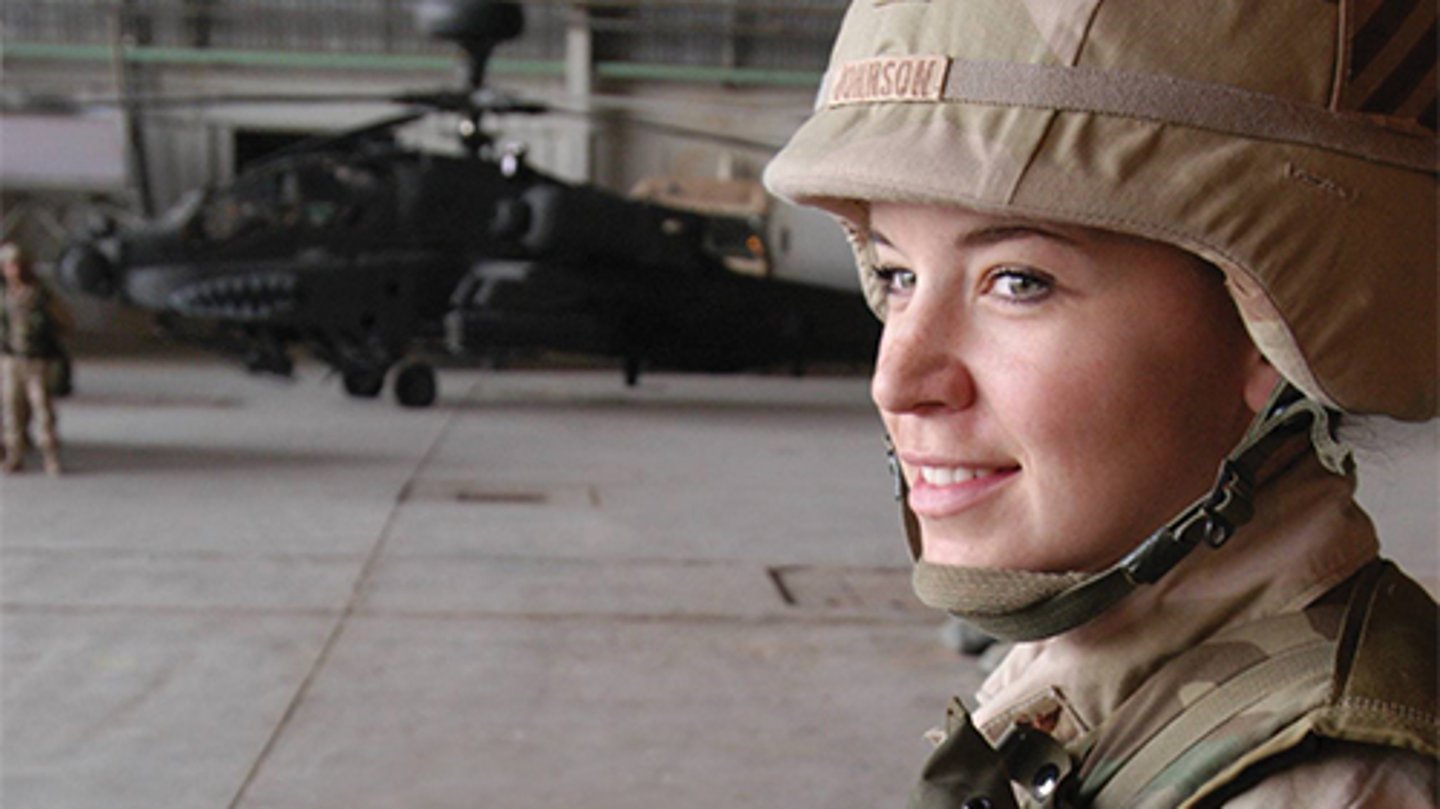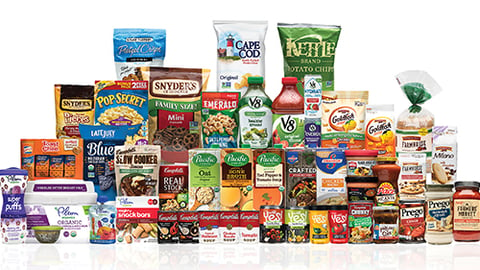Campbell Soup Exec's Journey From Combat to CPG
Before Toby Johnson spent her time rising through the ranks of the consumer packaged goods industry, she rose through the ranks of the U.S. Army – all the way to flying an attack helicopter during Operation Iraqi Freedom.
Johnson, 43, served in the army for seven years as an aviation officer and Longbow Apache helicopter pilot, achieving the rank of captain, and was deployed to Iraq as part of the 2003 invasion.
Fast-forward to 2020, when Johnson was named SVP of sales at Campbell Snacks in July. Johnson says that many people ask how her military experience prepared her to be a leader in corporate America, and specifically in the fast-evolving CPG industry.
“My military experience was my foundation in learning how to motivate people, how to lead,” explains Johnson, who recently joined Camden, N.J.-based Campbell after a 13-year tenure at PepsiCo. “I learned about types of people, including about myself, and being able to make mistakes and grow as a leader. And then certainly, the transition through business school helped me a lot in trying to figure out how do you take that foundation and translate that to corporate America.”
Johnson’s journey to executive leadership roles in the CPG industry includes a stint at Harvard Business School for an MBA, and a philosophy degree from the U.S. Military Academy at West Point.
“I had my first direct report as a sophomore in college at West Point,” she says. “It was a gift to lead early in life and to really figure out who I was authentically as a leader.”
After the military, Johnson started out as an intern at Purchase, N.Y.-based PepsiCo and ended up holding a variety of roles before rising to region VP of the company’s Frito-Lay division. While there, she says that she amassed strategic experience in direct-to-store delivery and execution excellence in snack foods.
“PepsiCo is a company that values its people, and seeing how you can put leadership principles into practice in one of the best-run companies in the world was an incredible chapter in my development,” Johnson notes.
The Soup Surge
There’s no question that Johnson has joined Campbell at probably the most pivotal and transformational time for the iconic American company.
Before the pandemic, Campbell had been in the throes of a multiyear turnaround plan. A new CEO and CFO had been installed over the past two years. The company’s board had been refreshed with the addition of three directors with extensive CPG and marketing expertise. And now, the pandemic has presented Campbell with an unprecedented opportunity to supercharge that turnaround plan for growth.
“When you look at the business, the opportunities and the brands that Campbell’s has assembled are absolutely incredible,” Johnson asserts. “The amount of change and transformation that a 150-year-old company has gone through in the past couple of years is amazing. The ability to be agile, to evolve and even leapfrog where the rest of the industry is positioned right now is very exciting, especially with the way the business is positioned.”
What she means by “positioned” is poised for turbo-charged growth.
In June, the company reported booming sales during its third quarter on massive consumer demand during the COVID-19 crisis. Net sales at Campbell increased more than 14%, from $1.953 billion in the prior-year quarter to $2.238 billion for the quarter ended April 26. Profit tripled to $156 million, versus $53 million during the same period in 2019. Also, the company says that it’s seeing pandemic-related demand increase its household penetration by 6% year over year.
Thanks to this sales boom, Campbell raised its guidance for the 2020 fiscal year, from a -1% to 1% increase in sales to a 5.5% to 6.5% increase. Now the company is focused on keeping many of these consumers, who are getting used to a “new normal” of remote work and meals mostly consumed at home.
Johnson will lead the Campbell Snacks division, where net sales for 2019 were $3.784 billion. The portfolio includes power brands such as Goldfish, Pepperidge Farm, Kettle Brand Chips, Cape Cod, Lance, Snyder’s of Hanover, Late July, Pretzel Crisps, Emerald Nuts and Pop Secret.
Johnson observes that the pandemic, specifically, is presenting consumers with more opportunities for snacking. Many consumers are working from home, more hours, all online, and they take more breaks that require smaller meals.
“Those breaks become even more important with the intensity of online communication all day,” she points out, “and that getaway becomes a moment where you can take a break and enjoy a snack. You may not have the time to prepare a full meal. You might be able to do some quick scratch cooking. But the accessibility of snacking is becoming a more important part of people’s lives.”
According to Johnson, Campbell is looking at adding more manufacturing capacity to meet demand. The company has been holding meetings with retailers to try to determine what shoppers’ needs are now and six months from now, as well as how much they’re buying.
“Across the CPG industry, keeping up with supply is the challenge that everyone is facing,” Johnson admits. “In a way, it’s a great problem to have, if you have product that you’re making that people want to buy so much of, and [you’re] not sure you can make enough of, since they’re selling so well. But being able to look around the corner from a supply-chain standpoint is critical. What’s the positive possible range of growth that you could experience? And then having those candid conversations with your retail partners. This is what we can deliver.”
Johnson adds that the company is ramping up production of some core snack products, such as its Goldfish brand, in anticipation of more sales spikes as the pandemic persists.
Time for Leadership
With a raging pandemic, an economy in recession and unprecedented levels of stress for workers, leadership is more important than ever in the CPG business. So how does Johnson plan to support and lead her team during this time of profound change? She says that she goes back to what she learned flying those missions for the army: the philosophy of servant leadership.
“As a leader, if you can remove obstacles for your team and allow them to shine, that is the best way to operate,” Johnson notes. “As one person, you can’t accomplish all the things that you can with an extremely capable and empowered team. So if you, as a leader, have a team that operates where your role is to remove obstacles and make them successful, you have really high standards and are deeply devoted to your team’s ability to achieve them, that’s very powerful.”
She adds that these principles are especially critical during the time of crisis facing the food industry.
“People are relying on food brands and the entire industry that supports that, all the way through that value chain,” Johnson observes. “It’s so important right now to people for a sense of normalcy, connection, comfort, quality. Everyone has their challenges they’re facing right now, but that challenge also has huge opportunity in the relationships that we are strengthening with our consumers and our retailers as we work through this and really deliver something valuable to people in their homes every day.”
Value will likely play an increasingly important role for American consumers going forward, and Campbell’s products historically have been highly relevant in moments of recession or economic pressure. But that value proposition also increasingly includes e-commerce. That’s why Campbell is boosting spending on e-commerce and focusing on its core products to retain new households.
“The growth of e-commerce and other things are going to continue to evolve very rapidly over the next three to six months,” Johnson notes. “In this time of pandemic and [the] tumultuous nature of our environments, I feel like there’s a big opportunity for me to have a positive impact as a leader, and if I can look back on this experience and feel like I had an impact, that will be really rewarding.”







